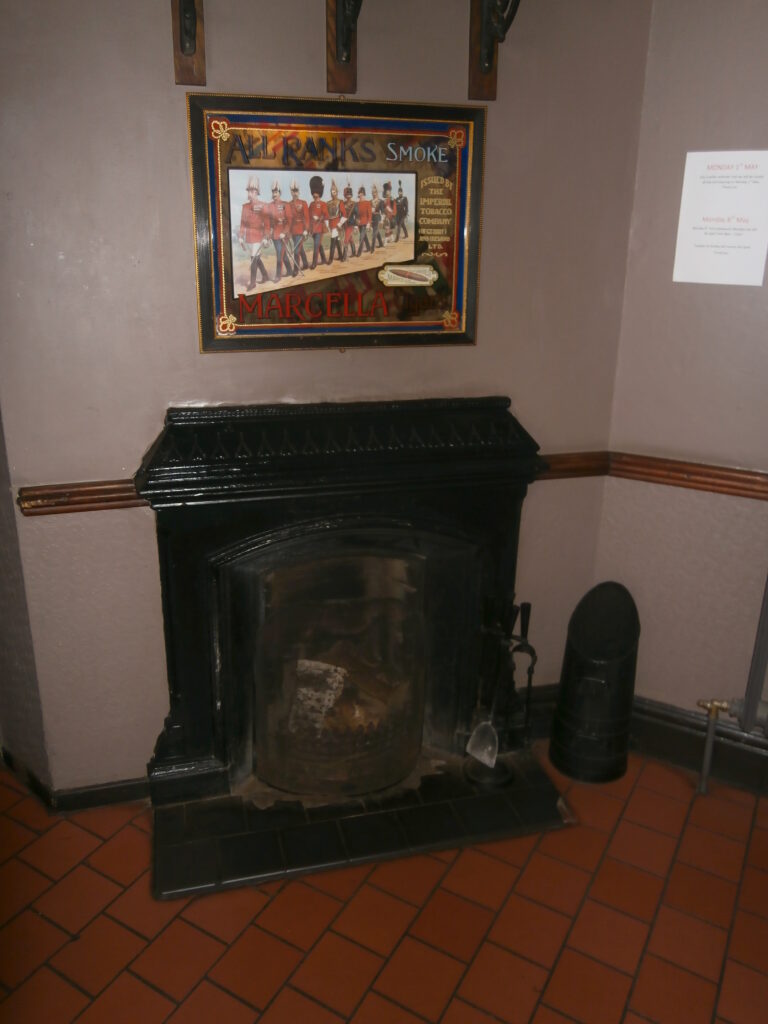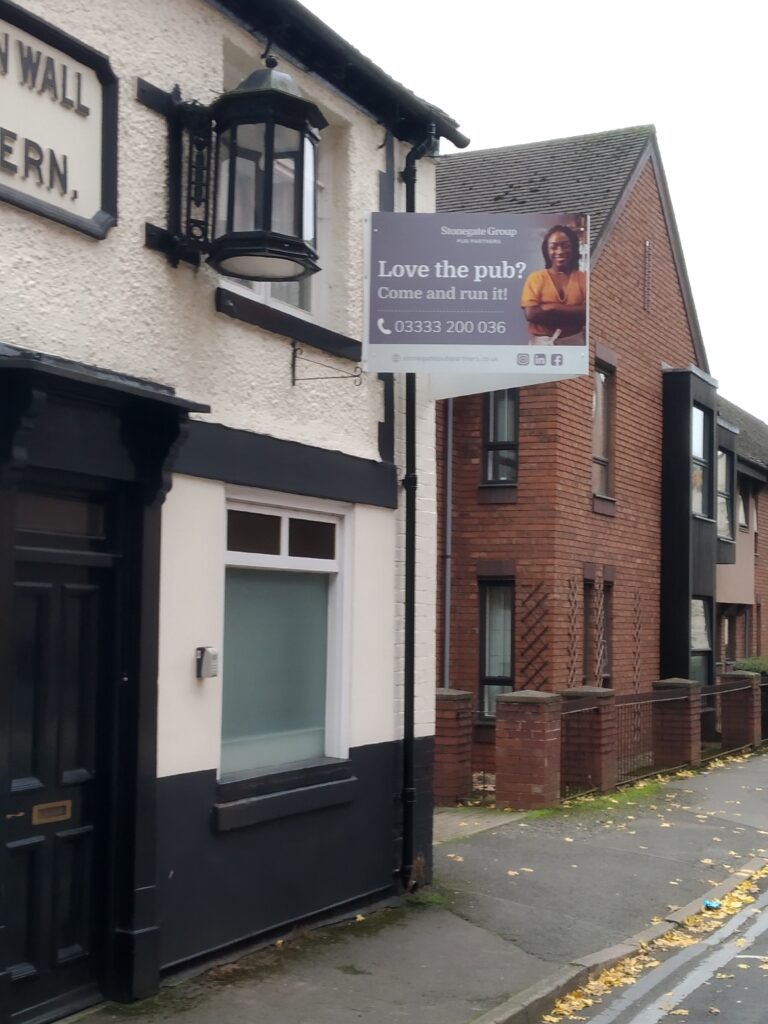
Last August, one of Coventry’s most iconic pubs closed its doors to the public and its future is still uncertain. The Town Wall Tavern had served generations of Coventry people and especially theatre folk and newspaper reporters.
Tucked behind the Belgrade Theatre and close to the Coventry Evening Telegraph offices, the pub used to have a dedicated clientele who valued its quirky character and well-kept beer. Long before working from home became the norm, working from the pub was common in the newspaper industry.
Thespians performing at the Belgrade Theatre found the pub close to the stage door and would retreat there after a performance to relax and enjoy a pint of Bass. Audience members in the know would order their interval drinks in advance and the landlord would have them lined up for a rather rushed interval.
Two centuries ago, whilst housing had been constructed along Hill Street and Well Street, the area between was the course of the Radford Brook and was left undeveloped. A narrow footpath connected Hill Street and Well Street, which followed the foundations of the City Wall.
This path had gardens on the city side and an orchard and a peppermint plantation on the country side. The footpath was actually called ‘ The Town Wall ‘ and later became Bond Street. The first buildings were a terrace of cottages including the Town Wall Tavern which were erected in 1825.
This pub appears to have originated as a beerhouse. In the 1841 census James Shilton, a ribbon weaver, is running it. By 1845 it has become a public house and in 1850 the licensee is Silvester Penn.
Notable licensees in recent years have been Terry Jones in the mid-1970’s, who went on to the Old Windmill, Ray Hoare from 1977 to 1983 and Martin McKeown in the early 1990’s. Martin now runs the Gatehouse, just a stone’s throw away in Hill Street.
Since the last World War, the Town Wall has had a somewhat fraught existence. It was served with a compulsory purchase order in 1957 and subsequently there were five successive redevelopment schemes.
In 1964 the cottages alongside the pub were demolished to make way for a car park. In 1976 the city council unveiled their plans to have a hotel built where the Town Wall stands. However, the Town Wall always had influential supporters amongst the journalists from the nearby Coventry Evening Telegraph and the acting profession from the Belgrade Theatre.
In order to appease the regulars, the hotel was actually going to incorporate the pub! Opposition to these plans reached the national press in the Guardian on 19th September, 1980. By that time the hotel scheme had been abandoned due to an economic recession. The compulsory purchase order remained though. It was not until 1982 that it was rescinded, 25 years after first being imposed.
Since that time the pub has been extended rearwards. The new rear wall enclosed the old one, which now forms an internal partition. This, along with the original rooms, creates an area of real charm.
In his book “Closing Time”, Chris Arnot reflects on the pub and its landlords. He describes how the Donkey Box got its name. The snug is claimed to be the smallest in England, measuring seven foot eight inches by five foot five. It is said that it got the name when a donkey was in the cast of a Belgrade Panto and someone had the idea of seeing if it would fit in the snug – it did! Just!
But things change. The Coventry Evening Telegraph is less than a shadow of its former self and its few remaining city staff have moved to the Canal Basin.
The idea of drinking at lunchtime went out of fashion in many businesses when flexitime was introduced. Taking a shorter lunch “hour” and leaving work earlier was more attractive to many previous drinkers.
Traditional pubs serving traditional beer are not the tipple of the young students, who live in the high-rise blocks that now surround the Town Wall Tavern. Those of them who still drink prefer giant food-oriented premises, enormous cheap Wetherspoons or light and airy cafe bars.
Most pubs are now owned by large companies and high profits are demanded by investors. The days of the small family run pub have passed. The Town Wall Tavern is owned by the Stonegate Group, the country’s largest pub owning company. Their website shows the guide rent of the Town Wall is £673 per week or £35,000 per annum.
Overhanging this is the value of the land that the pub sits on. It can be very tempting to close a less profitable pub and build flats on the site instead. Some of Coventry’s large suburban pubs, having been built with large car parks, have succumbed to the developer’s pound.
But the traditional pub still hits a special spot in the national psyche. The success of the Windmill in Spon Street and the Rainbow in Allesley demonstrate that, as does the success of CAMRA, the Campaign for Real Ale.




Up and down the country there have been campaigns to save local pubs, with mixed success. The outrage caused by the destruction of the Crooked House in Dudley show that people want to retain our heritage pubs, even if they don’t drink in them.
There are two protections that can help save heritage pubs. These are designating them as “Assets of Community Value” and planning legislation.
Assets of Community Value
CovSoc member, Fred Luckett, author of Coventry Pubs and 1000 Years of Coventry Pubs, casts doubt on whether it is possible to save a pub such as the Town Wall Tavern. Fred points out that pubs that have been saved in the past have been in villages, where the community can come together and take on the ownership itself.
“In such cases the pub may be the only community asset, there is little or no competition and the community may be very enthusiastic. The problem is that in an urban environment there are plenty of alternative venues so that the loss of one pub seems to be of little consequence. Around the Town Wall there is Hops D’Amour, the Gatehouse, Town Crier and Old Windmill, whilst almost every cafe in Coventry seems to possess an alcohol licence.”
Fred added “I have no knowledge off hand of any urban pubs being purchased by their community – such cases must be very rare.”
Planning Legislation
Demolition and change of use of former pubs requires planning permission. But there is a presumption that permission will be granted unless there are outweighing factors.
If the pub is listed then there is a higher bar to its demolition or redevelopment. In Coventry, the Golden Cross, Old Windmill, and Biggin Hall are all listed.
Of lesser status are local listed buildings. The Town Wall Tavern is in this category. In these cases, planners must take account of the heritage value of a property in making their decisions, but there is not such a strong case for retention – as we saw with the destruction of the Black Horse at Spon End.
Also. some pubs might be in a Conservation Area. This can add to the weight of evidence against demolition. The Town Wall Tavern also benefits from this designation, being part of the Spon Street Conservation Area.
But no building is safe unless it is in productive use. Left to the elements, without care and maintenance, it is likely that the heritage building will suffer from a mysterious fire, which leaves it in a state where it needs to be pulled down for safety reasons.
List Your Local
Last year, prompted into action by the destruction of the Crooked House, the West Midlands Combined Authority and CAMRA joined forces to try to preserve our historic pub heritage. The “List Your Local” campaign invited the public to submit the heritage pubs they valued for consideration for listing.
By February 2024, 119 nominations had been received. These were carefully examined by CAMRA’s Pub and Club Campaigns Committee. From this 17 were identified as having a realistic chance of being listed and five have been submitted to Historic England for listing. Unfortunately, none of these were in Coventry.
But the website is still open and readers might want to submit the Town Wall Tavern, or their own local for consideration.
Draft legislation was submitted to Parliament to require local authorities to hold a register of heritage pubs and to improve the process for purchase of community assets. However, this draft legislation fell with the calling of the General Election. We are yet to see whether it is resurrected under the new Government.
So, for the moment, the best future for the Town Wall Tavern would be for some entrepreneurial person to come along and take on the licence for the benefit of all the old regulars who miss their local pub and younger people who might come to love it as well. Perhaps that is you?

With thanks to Fred Luckett and CAMRA for contributing to this blog post. Photos Fred Luckett and John Payne
